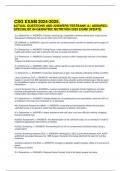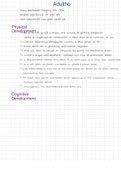CSG EXAM 2024-2025.
ACTUAL QUESTIONS AND ANSWERS TESTBANK A+ ASSURED.
SPECIALIST IN GERIATRIC NUTRITION 2025 EXAM UPDATE.
D in Deteremine >> ANSWER> Disease; warning sign of possible nutritional deficiencies; many chronic
diseases are affected by diet and are often concurrent with depression
DETERMINE >> ANSWER> acronym used for the nutritional health checklist to identify warning signs for
nutritional problems
E in Deteremine >> ANSWER> Eating Poorly; under eating and overeating may both adversely affect
health andnutrition; poor diet in general with lack of variety and alcohol
E in Deteremine >> ANSWER> Economic Hardship; income is often substantially reduced in the elderly
and
impacts the ability to purchase healthy foods
E in Deteremine >> ANSWER> Elder Years- above age 80; as age advances, the risk for developed
health issues and needing assistance increases
I in Deteremine >> ANSWER> Involuntary weight loss or gain; may indicate underlying medical condition
Level I Screening Tool >> ANSWER> identified individuals who require further nutrition assessment
based on results from BMI calculations, dietary habits, living situation and functional status. May be used
by manydifferent types of caregivers and may determine the need for further medical, SS and nutritional
interventions.
Level II Screening Tool >> ANSWER> must be completed by a specially trained healthcare provider;
involves anthropometric assessment, labs, full evaluation of medication use, social/living situations,
eating habits,neurological status and functional status
M in Deteremine >> ANSWER> Multiple Medicines; drug interactions and side effects; more than 50% of
all elderlyon more than one medication on a daily basis
Mini Nutritional Assessment (MNA) >> ANSWER> screening tool developed by Nestle that has been
validated foruse in the geriatric (older than 65) population to identify malnutrition;
N in Deteremine >> ANSWER> Needs assistance with self-care; may have difficulty walking, shopping,
buying orcooking food
Nutrition Assessment >> ANSWER> the determination of the nutritional status of an individual in order to
implement appropriate interventions as needed
Nutrition Screening >> ANSWER> the identification at risk for compromised nutritional status using a
screeningtool
Nutrition Screening Initiative (NSI) >> ANSWER> developed in 1991 as joint effort between ADA, AAFP
andNCOA; developed because the 1988 Surgeon General's Workshop identified the need for nutrition
screening
Questions asked on the MNA >> ANSWER> changes in appetite, weight changes, ability to move around,
recent
life stressors (death)
R in Deteremine >> ANSWER> Reduced Social Contact; third of all elderly people live alone
,T in Deteremine >> ANSWER> Tooth loss/Mouth Pain; oral discomfort affects one's ability to chew,
swallow andtaste foods
,D in Deteremine >> ANSWER> Disease; warning sign of possible nutritional deficiencies; many chronic
diseasesare affected by diet and are often concurrent with depression
DETERMINE >> ANSWER> acronym used for the nutritional health checklist to identify warning signs for
nutritional problems
E in Deteremine >> ANSWER> Eating Poorly; under eating and overeating may both adversely affect
health andnutrition; poor diet in general with lack of variety and alcohol
E in Deteremine >> ANSWER> Economic Hardship; income is often substantially reduced in the elderly
and
impacts the ability to purchase healthy foods
E in Deteremine >> ANSWER> Elder Years- above age 80; as age advances, the risk for developed
health issues and needing assistance increases
I in Deteremine >> ANSWER> Involuntary weight loss or gain; may indicate underlying medical condition
Level I Screening Tool >> ANSWER> identified individuals who require further nutrition assessment
based on results from BMI calculations, dietary habits, living situation and functional status. May be used
by manydifferent types of caregivers and may determine the need for further medical, SS and nutritional
interventions.
Level II Screening Tool >> ANSWER> must be completed by a specially trained healthcare provider;
involves anthropometric assessment, labs, full evaluation of medication use, social/living situations,
eating habits,neurological status and functional status
M in Deteremine >> ANSWER> Multiple Medicines; drug interactions and side effects; more than 50% of
all elderlyon more than one medication on a daily basis
Mini Nutritional Assessment (MNA) >> ANSWER> screening tool developed by Nestle that has been
validated foruse in the geriatric (older than 65) population to identify malnutrition;
N in Deteremine >> ANSWER> Needs assistance with self-care; may have difficulty walking, shopping,
buying orcooking food
Nutrition Assessment >> ANSWER> the determination of the nutritional status of an individual in order to
implement appropriate interventions as needed
Nutrition Screening >> ANSWER> the identification at risk for compromised nutritional status using a
screeningtool
Nutrition Screening Initiative (NSI) >> ANSWER> developed in 1991 as joint effort between ADA, AAFP
andNCOA; developed because the 1988 Surgeon General's Workshop identified the need for nutrition
screening
Questions asked on the MNA >> ANSWER> changes in appetite, weight changes, ability to move around,
recent
life stressors (death)
R in Deteremine >> ANSWER> Reduced Social Contact; third of all elderly people live alone
T in Deteremine >> ANSWER> Tooth loss/Mouth Pain; oral discomfort affects one's ability to chew,
swallow and taste foodsD in Deteremine >> ANSWER> Disease; warning sign of possible nutritional
deficiencies; many chronicdiseases are affected by diet and are often concurrent with depression
, DETERMINE >> ANSWER> acronym used for the nutritional health checklist to identify warning signs for
nutritional problems
E in Deteremine >> ANSWER> Eating Poorly; under eating and overeating may both adversely affect
health andnutrition; poor diet in general with lack of variety and alcohol
E in Deteremine >> ANSWER> Economic Hardship; income is often substantially reduced in the elderly
and
impacts the ability to purchase healthy foods
E in Deteremine >> ANSWER> Elder Years- above age 80; as age advances, the risk for developed
health issues and needing assistance increases
I in Deteremine >> ANSWER> Involuntary weight loss or gain; may indicate underlying medical condition
Level I Screening Tool >> ANSWER> identified individuals who require further nutrition assessment
based on results from BMI calculations, dietary habits, living situation and functional status. May be used
by manydifferent types of caregivers and may determine the need for further medical, SS and nutritional
interventions.
Level II Screening Tool >> ANSWER> must be completed by a specially trained healthcare provider;
involves anthropometric assessment, labs, full evaluation of medication use, social/living situations,
eating habits,neurological status and functional status
M in Deteremine >> ANSWER> Multiple Medicines; drug interactions and side effects; more than 50% of
all elderlyon more than one medication on a daily basis
Mini Nutritional Assessment (MNA) >> ANSWER> screening tool developed by Nestle that has been
validated foruse in the geriatric (older than 65) population to identify malnutrition;
N in Deteremine >> ANSWER> Needs assistance with self-care; may have difficulty walking, shopping,
buying orcooking food
Nutrition Assessment >> ANSWER> the determination of the nutritional status of an individual in order to
implement appropriate interventions as needed
Nutrition Screening >> ANSWER> the identification at risk for compromised nutritional status using a
screeningtool
Nutrition Screening Initiative (NSI) >> ANSWER> developed in 1991 as joint effort between ADA, AAFP
andNCOA; developed because the 1988 Surgeon General's Workshop identified the need for nutrition
screening
Questions asked on the MNA >> ANSWER> changes in appetite, weight changes, ability to move around,
recent
life stressors (death)
R in Deteremine >> ANSWER> Reduced Social Contact; third of all elderly people live alone
T in Deteremine >> ANSWER> Tooth loss/Mouth Pain; oral discomfort affects one's ability to chew,
swallow and taste foodsD in Deteremine >> ANSWER> Disease; warning sign of possible nutritional
deficiencies; many chronicdiseases are affected by diet and are often concurrent with depression






